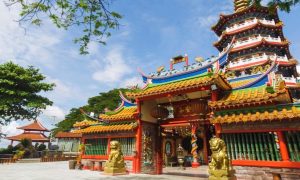AS THE WORLD FACES A GLOBAL CLIMATE CRISIS AND RESOURCES BEGIN TO DIMINISH, PEOPLE ARE SEEKING SUSTAINABLE ALTERNATIVES FOR THEIR NEEDS. MALAYSIA’S PALM OIL INDUSTRY CAN PROVIDE ONE OF THE ANSWERS.
There is perhaps nothing that scares humankind more than the idea of finiteness. Whether it be the idea of losing loved ones or misplacing items that can never be recovered, we are preoccupied with this idea that nothing is eternal. This has manifested itself more recently in the worry about climate change, which has served as a unnerving reminder that the planet we call home, and the resources on its surface that are vital to our existence, will not last forever.
However, though our resources are finite, with careful consideration of the environment, certain vital products can be produced sustainably, and thus ensure that the steady grow in demand can be met. One of these sustainable, and perhaps one of the most under appreciated, products is palm oil.
MALAYSIA PROVIDES
The golden yellow palm oil is an edible, vegetable oil that has long been used for cooking primarily in the tropical regions. In recent years, it has been discovered throughout the world. Though the oil palm tree is native to West Africa, it has now found a home in Southeast Asia. These days, palm oil has become a hugely popular product for the rest of the world too, and is now used in all manner of products, from cosmetics to pre-packed food. Palm oil has even proved successful in the production of biodiesel.
Malaysia is at the forefront of the palm oil industry, and is one of the world’s leading producers and exporters, with a list of export destinations that continues to rise. The statistics, which can be viewed on the website of the Malaysian Palm Oil Council (MPOC), are continually impressive, and as of October 2012, Malaysia’s worldwide export of palm oil was up 400,000 tonnes compared with 2011.
A growing market is one thing, but another is the need for sustainability of the product, and this is an issue that the MPOC and the industry take incredibly seriously. Many Malaysian palm oil producers became the founding members of the Roundtable on Sustainable Palm Oil back in the early 2000s and, through various efforts, the Malaysian palm oil industry has continued to strive to keep the oil palm plantations in Malaysia as sustainable as they can be, and ensure the world is aware that palm oil can be a viable alternative to other oils.
MAKING IT LAST
The Malaysian palm oil industry is recognised as setting the standards for the world in sustainability, and while recent interventions have served to monitor the sustainable practices involved in the process, the Malaysian oil palm plantations have long been managed with a mind to sustainability and responsibility.
Palms were planted on previously zoned agricultural land that was used for the cultivation of rubber, cocoa, and coconut plantations, ensuring available agricultural land was optimally utilised. Regulations are also in place, and while less than 20% of Malaysia is used for agriculture, more than 50% is dedicated to permanent rainforests, a percentage that is protected by government legislation.
Despite the small proportion of Malaysia’s land mass that is used for agriculture, of which palm oil makes up just under 5 million hectares of the 33 million hectares that constitute the country, the quantity of valuable oil that can be produced every year is staggering.
In productive capacity and efficiency of land use, palm oil scores well above any other oil crop, and in productivity per hectare, palm oil comes in at close to ten times more productive than soybean or rapeseed. With the worldwide demand for edible oils and fats continuing to soar – predicted to hit 184.4 million metric tonnes by 2020 – palm oil represents one of the options for supplying this demand.
BEING GREEN
While the productivity of the palm oil plantations can ensure a high yield, the plant can also be cultivated in a way to have a minimum amount of impact on the environment; equally important when considering the issue of sustainability. Each oil palm tree remains economically viable for 20-30 years and during this period no major tilling is necessary, minimising the level of disturbance of the soil takes place.
Malaysia is also fortunate to have the ideal climate for the oil palm, and the frequent rain precludes the need for irrigation. By enjoying limited interference from humans, the palms can retain their natural ability to fight off pests and thus reduce the need for chemical fertilisers which can be harmful to the environment. This is further aided by the fact that, here in Malaysia, a natural fertiliser is created from waste left over from its biomass after palm oil production and can be used to nourish the plants naturally.
Waste management forms an important part of the MPOC’s initiatives to increase sustainability of the palm oil industry, as does soil conservation. The plantations make special efforts to undertake measures such as planting leguminous crops to mitigate and minimise soil erosion, as well as keeping livestock on the plantation land to maximise the use of the land.
It is also not enough to just have these regulations in place, and the industry, through the Malaysian Palm Oil Board, spends a portion of its time regulating to ensure these measures are met, as well as hosting events to network with groups around the world to further develop more sustainable practises.
Sustainability is the watch word for this generation, and is a necessary approach to ensure that the resources of our planet aren’t consumed faster than they can be replenished. Palm oil’s impressive yields and amazing versatility in the market suggests that this crop could be a vital one in the years to come.
———————————————————————————————————
For more information on the Malaysian Palm Oil Council, visit www.mpoc.org.my.
———————————————————————————————————
Source: Senses of Malaysia Nov-Dec 2012
Read more:
















